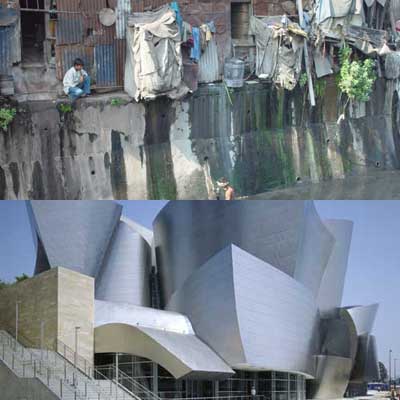
Jan '05 - Sep '06
I've been back home in New Hampshire for the past three weeks, relaxing and working at the office where I interned this summer. I've been doing a lot of thinking as well. I feel somewhat torn with regard to architecture these days. I see two very different--perhaps opposing aspects of architecture--the more artistic side that is concerned with space-making and so on, and the more directly social/humanitarian side that is concerned with directly improving (or at least changing) the world. I know this is a bit of simplification as the matter is quite complex, but this is the easiest way I can think of to explain it.
I think in a way my two design professors from last year could be a good example of these opposing interests. My professor first semester was focused on developing a rigorous design philosophy, one concerned with the design of spaces and the employment of form to fulfill the objective of the design. Everything was driven by the design concept in a very metaphoric way. It was truly artistic expression, which was great and which I enjoy very much. I think architecture has the real potential in this way to be art that is accessible to the masses and affects the greatest number of people, and especially important in this instance is the experientiality of the built world, and how that can influence and transform people. This was actually the basis of the essay that I included in my portfolio for entrance to the BArch program that spring. Still, that transformation based in spacial experience and artistic expression through the built environment is a purely spiritual one, and I would argue an individual one.
My professor during the spring semester, who I did work/study for this past semester, was concerned with some of these same ideas, but in the time I have spent working for her, I have come to realize that her focus (as far as I can tell) is more on the humanitarian aspects of architecture. She taught a class that many of my friends took this past semester about nomadic and emergency shelter, including some of the work being done by folks like Architecture for Humanity in New Orleans and Pakistan. Whereas experiencing certain spaces in the built environment can be transformative on a spiritual level, the simple provision of shelter or a place to teach children--or the provision of quality low-income housing in this country that instills a sense of pride or ownership--can elicit a profound social or communal change.
It reminds me of something that was repeated each summer that I worked at a Salvation Army camp in Maine; you cannot try to talk to someone about spirituality when their primary concern is finding food or shelter. Still, I want to make buildings one day that will bring about a spiritual transformation on the people who inhabit them--even if it is a very subtle one. I think this is the goal of any "good" design; architects design buildings and spaces in the hopes that they will be better than or enhance what they replace or alter, thus inevitably transforming the lives of the people who experience them on some aphysical (I know it's not a real word) level, which I would simply call spiritual.
At the same time, I believe that architecture not only can, but must have a very active social agenda. We can't build in a vacuum. What we design and build changes the world in the most physical and literal way possible. We can't take that enormous responsibility lightly. Don't we have a moral obligation to try to improve the social order of the world through our abilities and our design? Don't we have a moral responsibility to do all we can to improve the natrual environment; to make our communities better, healthier and more sustainable (in all aspects) places; to make our world less divisive and more cohesive; to lift people out of poverty and equip them with the basic structures to improve their own lives as well? And if we can't maintain our livelihoods and do these, don't we have a moral obligation to try to change our society (perhaps at a governmental level) to help us accomplish these objectives?
I was reading somewhere--I tried to find it, but I can't remember at all where it was--about how architecture today has no social agenda, it's just a means to accomplish and reinforce economic agendas. I know this is a huge generalization, but it seems based in truth. Architects don't and rarely can operate on their own; they are in large part at the mercy of developers, corporations or whatever entity their client is. I know that sounds defeatist, but isn't it partially true? And if it is, are we in this position because we've abandoned some collective principles somewhere along the way or lost our integrity? This seems to be the case with regard to creating architecture that addresses both the spiritual and physical needs of people. What happened to architecture that would create a brave new world or provide housing to the poor? I just don't see it anymore. I think this post has it down--something seems to have changed or gotten lost. Again, it's a huge simplification here, but Gehry, Hadid, et al aren't improving anyone's lives, they're just appeasing their wealthy clients. An interview I read in Dwell with Deyan Sudjic about his book The Edifice Complex seems to reinforce this view.
I'm sorry this has become such a rant--and a somewhat incoherent one at that--but my thoughts on this aren't very organized. I think it's safe to say that I feel rather lost right now. Like I said, I feel torn between these two different aspects of architectural practice and how I'd like to use my design ability in the future, and I'm not sure how to reconcile these very dissimilar interests. I'm also not sure how to reconcile the very complex and contradicting forces in the field of architecture.
I put together two little collages basically of pictures (all stolen from google images of course--call it appropriations art if you care to be as pretentious as me, haha) that I think sum up these two things. The first (above) is more representative of the two different aspects of architecture I'm interested in pursuing, but also the question of how we, as a profession, can justify seeking to fulfill the "spiritual" needs of the already well-off, while neglecting the "physical" needs of the truly impoverished. The second (below) is basically meant to represent the different forces at work in the architectural profession in a broader sense.
I feel a little lost right now, but I guess I'm supposed to "find myself" in college--after all these are my "formative" years--and how can I find myself if I'm not lost.
8 Comments
"Life isn't about finding yourself. Life is about creating yourself."
-George Bernard Shaw
"Life is a beautiful struggle."
-Talib Kweli
best of luck developing a position.
The more you learn the more you find yourself to be lost. It's one of those sad side effects or something.
:)
"the man that knows something knows that he knows nothing at all."
-Erykah Badu
I sympathize with your struggle and can relate. I've found that in order to do what you seek (the balance of artistic expression and social awareness) it is necessary to pro-active and CREATE that change you seek. It's also become clear that we (architects) do in fact hold minimal power thought simultaneously are best prepared to provide viable solutions to social ills. I say this not because we are the only ones that can bring upon change, but rather because due to our multi-faceted nature perhaps we may be the most apt to provide multi-faceted solutions. Before this turns into a rant I'll end by saying that I'm glad to hear your concerns. I too am finding my way to balance both and more people like us that think like this need to get out and make it happen. Not having these hopes relegated to exist only as words in some new manifesto but rather fleshed out in built environments that can materialize these dreams and show a new way. To do so would mean adding risk and responsibility outside that of being only an architect but I believe that equally it will lead to added satisfaction and reward in doing so.
"The best way of saying is doing"
yes, yes yes! You are absolutely right. We all, not just architects and designers, have a moral obligation to try to improve the social order of the world. But architects and designers have a special obligation, since design is involved in every product, structure, and system we have, good and bad.
Hold on to your desire to help - the older you get and the longer you are actually in the working world, the harder it gets to stay true to what you know is right. The reality is that it's difficult to do good in the world - you'll need to earn a living and probably support a family and no one pays much, if anything, for good works. You only make decent money if you can make it easier for other people get richer.
Meanwhile, don't give it up. If you can inject your sense of ethics into all the work you do, you won't be wasting your time. See where it takes you.
Just go with the flow and try to find the median between reality and idealism. That's what you have to do be an architect. Balance is the key to success.
Hey Mike, Stop fackling so much pandy.
Block this user
Are you sure you want to block this user and hide all related comments throughout the site?
Archinect
This is your first comment on Archinect. Your comment will be visible once approved.